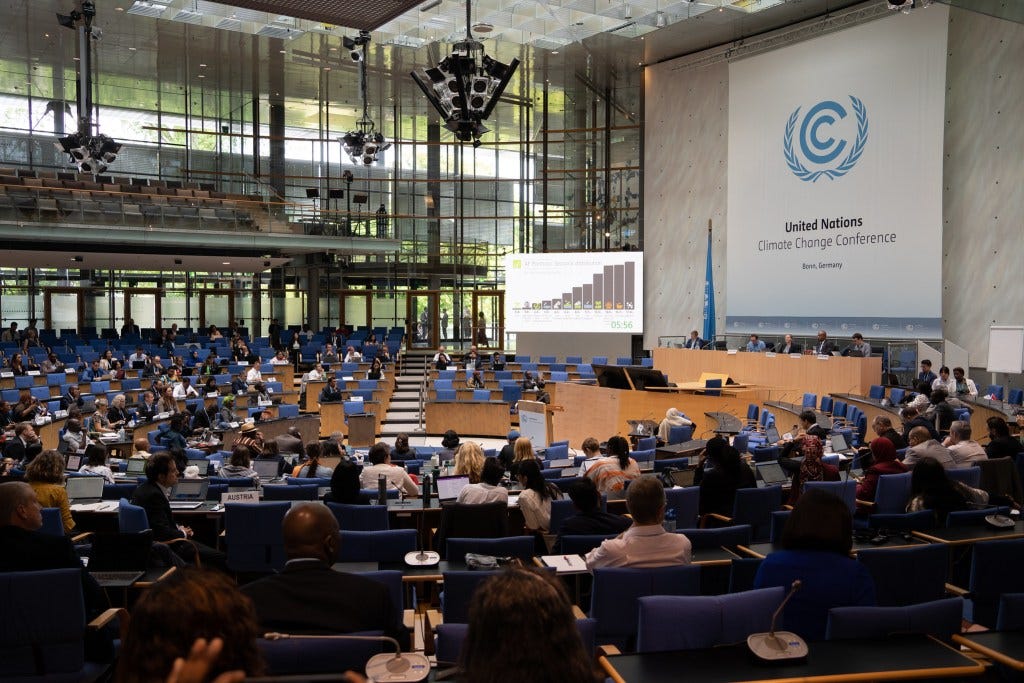After Bonn negotiations: Climate progress remains dangerously slow
Global climate negotiations are complex, needing to consider & address the needs of nearly 200 nations. The SB62 talks make clear: Climate rescue is possible, but progress is much too slow.
The SB62 round of United Nations Climate Change negotiations have concluded in Bonn, Germany. The key takeaway for many participants and observers seems to be: The SB62 advanced some important work, but real-world action is still lagging far behind what is needed, and there needs to be more good faith—and less stalling—in the process of reaching consensus to drive action.
Climate Civics wishes to note that transformational innovation and climate-resilient development can get started in all regions, even if negotiations move slowly. All governments should be striving to achieve the most climate-resilient, low-carbon development conditions for their people, and build future economic incentives and leverage on that basis.
Three procedural notes are worth highlighting:
The next formal negotiating session will take place during the COP30 Conference in Belém, Brazil, in November.
The ‘COP30’ technically refers to the negotiations around implementation of the 1992 Convention; there will also be formal negotations around the Kyoto Protocol, the Paris Agreement, and the Subsidiary Bodies for Scientific and Technological Advice (SBSTA) and Implementation (SBI). Each will have detailed agendas with 12 to 24 headline items and multiple subitems.
There will be intersessional meetings related to specific work programmes, working groups, the COP Presidencies, finance, and other matters, between now and November.
The Closing Plenary opened with a moment of silence for the late Ambassador Ayman Tharwat Amin Abdel-Aziz, who passed away earlier this year. Amb. Amin recently served as Ambassador of the Arab Republic of Egypt to the Republic of Croatia and was previously Minister Plenipotentiary for the Environment and Sustainable Development Department of Egypt and a permanent member of the COP27 Presidency, supporting efforts like the Sustainable Urban Resilience for the next Generation (SURGe) initiative and urging progress toward climate-resilient livelihoods for farmers and in vulnerable communities.
Egypt’s representative said of Amb. Amin:
For over 20 years, Ayman devoted most of his professional career to environmental causes—from biodiversity to sustainable development to climate change—shaping policy, empowering communities, and as a senior member of our COP27 Presidency team, launching initiative to better the lives and the livelihoods of communities, particularly in the area of agriculture… Perhaps more importantly, Ayman was a kind soul, always ready to offer a word of encouragement, a thoughtful perspective, or a moment of laughter, even in the hardest moment. The world is a little greener and all of us a little better because of him.
We consider this an important reminder that climate policy, negotiation, and implementation is done by human beings who work with others in good conscience, to advance the shared interests of people in diverse circumstances. It is through thoughtful and dedicated people of conscience that we are best able to trace and respond to teleconnections that work through planetary systems—the fabric of energy, motion, water, and weather that make everyday choices into climate impacts far away.
Though much work remains and many areas of work are stalled, negotiators in Bonn achieved progress in the following areas, among others:
Progress on distilling the list of Adaptation Indicators, under the UAE-Belém work programme;
Increasing integration of food systems into NDCs and NAPs;
Consideration of watersheds, fresh water resources, and water management as crucial to climate-resilient development investment and progress tracking;
Exploration of co-investment and catalytic financing strategies to mainstream climate action;
Discussion of climate banking as a core element of future national economic development;
Commitment to “ocean-based” NDCs, focused on reducing harm to ocean ecosystems from activities on land.
Each of these areas creates the very real possibility of a major expansion of the opportunity for climate-related finance and investment. It is also true, however, that concerted progress on greatly raising the ambition of national climate plans was not achieved, and in each of the above areas, potentially consequential stalling tactics have interfered with progress and may continue to do so.

Observers and representatives of vulnerable constituencies, including indigenous peoples and local communities, have called for proactive and ongoing inclusion of stakeholders in policy planning and implementation. The practical benefits of local observer insights are now better understood than in years past, but the complicated question of how to infuse a globally decentralized informal network of micro-scale implementers, observers, and stakeholders with advanced, precise, adaptive, right-scaled climate-related data management capabilities, has not been clarified in practical terms.
In other words: We know local insights are needed, and local intermediaries are needed to right-scale both data and finance flows, but there is no universal standard agreed for what it looks like to do that well. So, data is still not getting to everyone it needs to get to, slowing the transition to climate-resilient activities like regenerative farming and agroecological land use.
The Technology Implementation Programme (TIP) should, if well-designed and ambitiously activated, tip the balance toward universal access to this kind of value-building intermediary service, which can create local economies of inclusive climate-smart competition and investable returns on investment.
We note the words of Switzerland, speaking for the Environmental Integrity Group, in the closing plenary of the SB62:
This process—imperfect, complex, often slow—is also remarkable. It is one of the few places where all countries come together not in pursuit of power but in pursuit of a shared future. That is something worth protecting and something worth rallying around. We have a chance in Belém to achieve all three goals of the Paris Agreement.
Those three goals are, to simplify: limiting global heating to 1.5ºC, reducing harm and building resilience through successful adaptation measures, and mobilizing sufficient finance to make the climate transformation a reality for all people in all countries. The EIG statement also noted that “Science is not negotiable,” and called for the COP30 to be “the Nature COP” and to deliver a 1.5ºC action package.
Palau, speaking for the Alliance of Small Island States (AOSIS), said the SB62 negotiations were an opportunity to act with urgency to support sustainable development for all. AOSIS expressed alarm at the coordinated effort to disrupt and delay activation of science-based insights to reduce risk and build resilience, noting the real-world harm that will befall people in all regions if such efforts succeed. Noting the risk of a breakdown in trust from such obstructive behavior, AOSIS said:
Transparency is not only a technical requirement but a cornerstone of effective action.
The SB62 featured more frequent and detailed discussion of the universal practicality of focusing on the safety of the most vulnerable. In discussions around Adaptation, Mitigation, Finance, and Capacity Building, we heard Parties and Observers note that when the most vulnerable are made safe, everyone is made safe.
Malawi joined other developing countries in expressing alarm that there appears to be a “comfort zone” attitude blocking progress toward ambition, urgency, and resourcing sufficient to limit global heating to 1.5ºC. Malawi warned that failing to limit global heating and related climate impacts will have grave human impacts, saying:
This continuous demonstration of lack of urgency… takes out the hope for survival for the vulnerable women, youth, and other marginalized groups in our countries, including the indigenous people that we serve.
Chile warned that we are receiving near constant warnings of the already alarming cost and impact of climate disruption, even as emissions keep rising and atmospheric and ocean heat reach record levels. Chile also called for “vocal and active” cooperation to uphold constructive multilateralism, defend the Paris Agreement, and advance progress toward climate-resilient development.
Speaking for AILAC, Chile highlighted the need to not dilute language prioritizing human rights and gender as critical to the most effective and legitimate form of climate action. AILAC also urged Parties to consider the need to make access to climate-related financial support more open, inclusive, science-aligned, and beneficial to local communities.

Climate Civics sees an urgent need for coordinated progress on the following, in the lead-up to and during the COP30:
Robust, open and inclusive sharing of technology, including data-related technologies, platforms, and climate service-related business model innovation;
Multidimensional cooperative climate action in line with Article 6.8 of the Paris Agreement, with the broadest possible benefit to climate-resilient development in all regions;
Practical guidance for local, regional, and national action toward Adaptation indicators, plans, insight-sharing, and actions;
Climate banking innovation supporting local intermediary services and innovative solutions for affordable insurance and disaster response;
Leveraging food systems as a connective fabric of everyday economics that can benefit people and nature;
Valuing conservation and ecosystem restoration, as an achievement that builds value for everyone;
Creative engagement strategies that allow for localized cooperative economic development, supported by stakeholder input, and working toward all Paris goals, on the basis of the best available science.
For more insights into the ongoing international climate crisis response, and related negotiations, consult the Earth Diplomacy Leadership Initiative.


